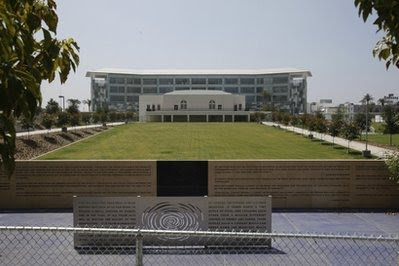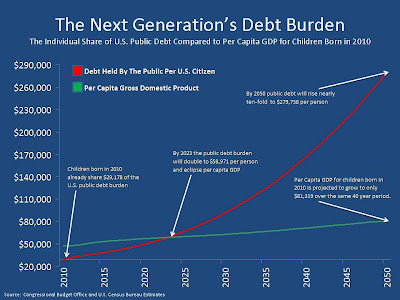
Rory Reid releases budget plan
Via Ralston's Flash, here is Reid's budget plan.
(Very) initial thoughts:
• Great line: "We cannot tax our way out of our problems." Maybe someone could send that memo to Horsford and Raggio.More thoughts will be coming, but the next time someone says we need to raise taxes in Nevada, show him this report.
• He pulls a lot of good ideas from Florida and the SAGE Commission.
• The plan assumes $615 million in tax revenues will appear.
• The plan is short on details in the "reinventing state government" section
Also Rory Reid will be on Face to Face tonight to talk about his budget plan.
One picture says it all: Why the national debt is a serious issue
This shouldn't just concern young adults, kids and anyone who cares about the children.
If you're depending on Social Security or Medicare at any point in the next 20 years, this should be absolutely terrifying. These debt levels are not sustainable and at some point benefits to the elderly are going to be on the chopping/reform block. If I were depending on Social Security and/or Medicare, I'd be demanding reform right now. (And if you're counting on the Social Security trust fund - think again.)
Denying that there's a problem with Social Security and Medicare will make future cuts and reforms even harsher for the elderly, because delaying the inevitable will only ensure that older adults aren't prepared for future reductions until after they've retired and it's much, much harder to save.
SimCapitalism
After reading this enlightening critique of the computer game "Caesar III" by Mattheus von Guttenberg today, I have decided that I should (note: "should" is not necessarily synonomous with "will") create my own video game.
Now, I have no familiarity with "Caesar III" or any of the newer simulation video games that endow the player with absolute power over a society of people, but it sounds remarkably similar to a game that I played once many years ago: SimCity.
Games like this are immediately frustrating. The player, tasked with building a growing and thriving city, is obligated to raise taxes in order to finance the construction of EVERY SINGLE DEVELOPMENT in the city. I remember playing SimCity many years ago and thinking, "These must be the laziest people on the planet! Why is it that there is no private construction going on at all in this city?"
After reading Guttenberg's review today, I can see that this genre of games still fails to incorporate the one fundamental component that drives economic advancement the world over: entrepreneurship. In fact, every "SimPerson" in these games is no more than a slave - going to and fro at the behest of the absolute ruler.
So my new game idea would be titled "SimCapitalism." This would be a new addition to the simulation genre that would allow for much easier gameplay. In fact, the player's only task would be to sit back and watch the city build itself!
It's amazing that the world's autocrats-in-training took the personal initiative to: (1) acquire a job to earn money; and (2) go to the store and purchase a game that would satisfy their highest utility. Yet, they completely fail to recognize the role that markets should play in that game.
But then, since they have no choice in schools, what else do you expect?
Housing market continues its decline
Ever since the first stimulus bill included a new homebuyer tax credit, free-market thinkers have been warning that the $8,000 tax credit wouldn't create any new demand for houses - it would only shift demand forward. And once the tax credit expired, demand would plummet.
And since the tax credit expired April 30 of this year, we see now that that's exactly what happened. In fact, July sales are at the lowest level in 15 years.
The National Association of Realtors said sales [of previously owned US homes] dropped a record 27.2 percent from June to an annual rate of 3.83 million units, the lowest level since May 1995. June's sales pace was revised down to a 5.26 million-unit pace. ...This result shouldn't surprise anyone. The exact same thing happened with Cash for Clunkers.
Home sales picked up in the spring when the government was offering tax credits. But the tax credits expired on April 30 and the market has been hobbled since.
Tax credits, like the homebuyer tax credit and Cash for Clunkers, aren't good policy, because they simply shift demand forward a few months while costing taxpayers tens of billions of dollars.
Fighting for the heart and soul
Nevada Sytem of Higher Education Chancellor Dan Klaich wants a 4.5 percent increase in state appropriations. Without it, he argues, the university system won't be able to function.
According to Dan Klaich, "we're in a fight for the heart and soul and future of Nevada."
It seems Dan Klaich, and many others, are forgetting some very important facts.
Like the fact that both UNLV and UNR saw dramatic increases in their budgets - far higher than inflation and student population growth combined. And that both universities blew alot of that money on administrators. Oh and don't forget about the fact that after all that money and all those new employees, neither university can graduate 50 percent of their students within 6 years.
If Chancellor Klaich really believes the universities need more money after all that, then you should worry about whether NSHE needs to go on a diet or have an exorcism.
L.A. opening $578 million public school

California has some of the worst test scores in the nation. Only 54 percent of its fourth graders can read at a basic level or better, and only 24 percent are at a proficient or better level.
Instead of spending money on improving teacher quality (the most important school-controlled factor in student achievement), the L.A. Unified School District is about to open the most expensive school in America.
Next month's opening of the Robert F. Kennedy Community Schools will be auspicious for a reason other than its both storied and infamous history as the former Ambassador Hotel, where the Democratic presidential contender was assassinated in 1968.A great line from Allah Pundit sums this atrocity up perfectly:
With an eye-popping price tag of $578 million, it will mark the inauguration of the nation's most expensive public school ever.
The K-12 complex to house 4,200 students has raised eyebrows across the country as the crème de la crème of "Taj Mahal" schools, $100 million-plus campuses boasting both architectural panache and deluxe amenities.
"There's no more of the old, windowless cinderblock schools of the '70s where kids felt, 'Oh, back to jail,'" said Joe Agron, editor-in-chief of American School & University, a school construction journal. "Districts want a showpiece for the community, a really impressive environment for learning."
Not everyone is similarly enthusiastic.
"New buildings are nice, but when they're run by the same people who've given us a 50 percent dropout rate, they're a big waste of taxpayer money," said Ben Austin, executive director of Parent Revolution who sits on the California Board of Education. "Parents aren't fooled."
So there you go, kids. There won't be any jobs waiting for you when you get out, but you'll have the time of your life until then. Enjoy the infrastructure!Fortunately, there are a lot of people doing great work on reforms that actually do increase student achievement. For instance, watch this ReasonTV interview with Madeline Sackley, the director of the school documentary "The Lottery."
Find out more about "The Lottery" here.
Pun in the sun

This morning on Steve Wark's radio show I noted that Florida implemented a third-grade social-promotion ban. Basically, if kids could not read at grade level by the end of third grade, they could be held back. "What a 'novel' idea," I said.
So in honor of my accidental pun, I present you with 10 more classics. Enjoy.
1. A vulture boards an airplane, carrying two dead raccoons. The stewardess looks at him and says, "I'm sorry, sir, only one carrion allowed per passenger."
2. Two fish swim into a concrete wall. One turns to the other and says, "Dam!"
3. Two Eskimos sitting in a kayak were chilly, so they lit a fire in the craft. Unsurprisingly it sank, proving once again that you can't have your kayak and heat it too.
4. Two hydrogen atoms meet. One says, "I've lost my electron." The other says, "Are you sure?" The first replies, "Yes, I'm positive."
5. Did you hear about the Buddhist who refused Novocain during a root canal? His goal: transcend dental medication.
6. A group of chess enthusiasts checked into a hotel and were standing in the lobby discussing their recent tournament victories. After about an hour, the manager came out of the office and asked them to disperse. "But why?" they asked, as they moved off. "Because," he said, "I can't stand chess-nuts boasting in an open foyer."
7. A woman delivers a set of identical twins and decides to give them up for adoption. One of them goes to a family in Egypt and is named "Ahmal." The other goes to a family in Spain; they name him "Juan." Years later, Juan sends a picture of himself to his birth mother. Upon receiving the picture, she tells her husband that she wishes she also had a picture of Ahmal. Her husband responds, "They're twins! If you've seen Juan, you've seen Ahmal."
8. A group of friars were behind on their belfry payments, so they opened up a small florist shop to raise funds. Since everyone liked to buy flowers from the men of God, a rival florist across town thought the competition was unfair. He asked the good fathers to close down, but they would not. He went back and begged the friars to close. They ignored him. So, the rival florist hired Hugh MacTaggart, the roughest and most vicious thug in town to "persuade" the friars to close. Hugh beat up the friars and trashed their store, saying he'd be back if they didn't close up shop. Terrified, they did so, thereby proving that only Hugh can prevent florist friars.
9. Mahatma Gandhi, as you know, walked barefoot most of the time, which produced an impressive set of calluses on his feet. He also ate very little, which made him rather frail and, with his odd diet, he suffered from bad breath. This made him a super calloused fragile mystic hexed by halitosis.
10. "Don't go John," Alice pleads to her husband as he boards a fishing trawler headed for the north Atlantic. "You won the lottery last week, we don't need the money. So why John? Why do you want to sail out into those dangerous icy waters again?" John folds his arms across his chest, the way manly fishermen do, and looks straight into his wife's eyes and says "I do it for the halibut."
Tune in
 I (Patrick Gibbons, education policy analyst at NPRI) will be on Steve Wark in the Morning, AM 670 (Las Vegas), Thursday at 8 a.m. Listen in to hear me discuss Brian Sandoval's education reform plan, teacher bailouts and, perhaps, my new commentary on administrative bloat in higher education.
I (Patrick Gibbons, education policy analyst at NPRI) will be on Steve Wark in the Morning, AM 670 (Las Vegas), Thursday at 8 a.m. Listen in to hear me discuss Brian Sandoval's education reform plan, teacher bailouts and, perhaps, my new commentary on administrative bloat in higher education.
Later on Thursday I will be on 91.5 FM with Dave Berns (another Las Vegas station) at 5 PM to talk about the new Goldwater Institute study on administrative bloat in higher education. I will be opposite Dr. Greg Brown, a history professor and president of the faculty alliance at UNLV.
A book that dispels the rationale for interventionism

The work of a former colleague of mine, Roy Cordato, was highlighted today in a Mises Institute article by Jeffrey Tucker. Roy's 1992 book, Efficiency and Externalities in an Open-Ended Universe was reprinted by the Mises Institute in 2007 and lays a great theoretical framework on how the traditional justifications offered for large-scale government interventionism can be addressed more efficiently through market processes.
I highly recommend the book and it can be downloaded from the Mises Institute for free as a PDF file.
Bracing for Obamacare
And a few ideas on how to improve health care.

 Read more
Read more


